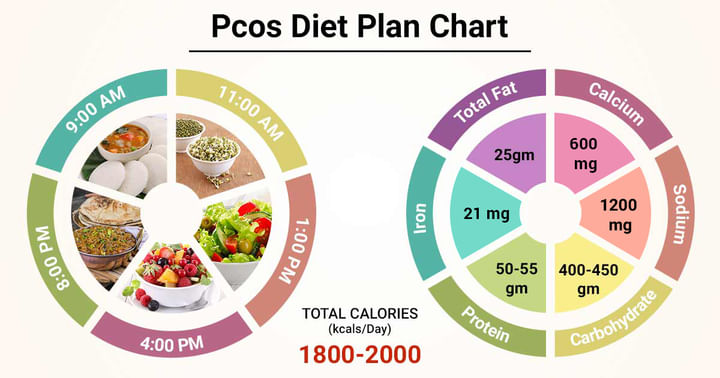Diet Chart for PCOS Patients
Last Updated: Aug 06, 2020
About PCOS
PCOS is one of the common problems faced by many girls in this modern world. A PCOS diet is a crucial role in the management of PCOS, not only for weight loss and maintenance but also to regulate insulin levels. Many women with PCOS are resistant to insulin, resulting in the pancreas producing more insulin in order to be effective.
Insulin is an important hormone as it transports sugar from the blood into the muscles of the body, allowing the body to effectively make use of the energy from glucose. High insulin levels wreak havoc on the body, leading to a lot of the symptoms of PCOS like, increased hair growth, weight gain, acne, fatty liver, and high cholesterol, polycystic ovaries, and an irregular menstrual cycle, not to mention increased hunger levels and cravings.
Sounds familiar, doesn’t it? So, the management of blood insulin levels is crucial in the management of PCOS. Refined carbohydrates cause a spike in insulin levels and should, therefore, be avoided. Also, foods that are high in fat will lead to weight gain and high cholesterol. Foods that have a high GI result in a quick rise in blood sugar levels. Insulin levels follow suit to deal with the glucose in the bloodstream.
Generally, high GI foods have been processed to remove fibre and other nutrients so they may be tasty but they are high in calories while lacking in nutrients. Some examples of high GI foods to avoid: white rice, white potatoes, white bread, rice cakes, muffins, and cakes. Saturated, hydrogenated, and trans fats are all fats that should be avoided. Saturated fats, found in red meat and dairy products, cause an increase in estrogenic production, hinder the absorption of some nutrients and can cause weight gain.
Diet chart for pcos patient
| Sunday | |
| Breakfast (8:00-8:30AM) | 3 Idli + Sambar 1/2 cup/ 1 table spoon Green chutney/ Tomato Chutney |
| Mid-Meal (11:00-11:30AM) | green gram sprouts 1 cup |
| Lunch (2:00-2:30PM) | 3 Roti+1/2 cup salad + Fish curry ( 100 gm fish)+ 1/2 cup cabbage subji. |
| Evening (4:00-4:30PM) | 1 Portion fruit(Limit the intake of high energy fruits. Eg: Banana, Jack fruit,Mango, Chikku.) |
| Dinner (8:00-8:30PM) | 2 Roti / chappati.+ Tomato subji 1/2 cup. |
| Monday | |
| Breakfast (8:00-8:30AM) | 2 Slice brown bread.+1 slice low fat cheese+2 Boiled egg white. |
| Mid-Meal (11:00-11:30AM) | 1 Portion fruit(Limit the intake of high energy fruits. Eg: Banana, Jack fruit,Mango, Chikku.) |
| Lunch (2:00-2:30PM) | Veg pulav rice 1 cup+ 1/2 cup Soya Chunk curry+ 1/2 cup Butter Milk. |
| Evening (4:00-4:30PM) | 1 cup light tea+ 2 wheat rusk. |
| Dinner (8:00-8:30PM) | 2 roti/ Chapathi+ Ladies finger subji 1/2 cup. |
| Tuesday | |
| Breakfast (8:00-8:30AM) | Chappati 3 + 1/2 cup Potato green peas curry. |
| Mid-Meal (11:00-11:30AM) | 1/2 cup boilled black channa |
| Lunch (2:00-2:30PM) | 1 cup rice+ 1/2 cup Dhal+ Palak subji 1/2 cup+ 1/2 cup low fat curd. |
| Evening (4:00-4:30PM) | 1 Portion fruit(Limit the intake of high energy fruits. Eg: Banana, Jack fruit,Mango, Chikku.) |
| Dinner (8:00-8:30PM) | Broken wheat upma 1 cup+ 1/2 cup green beans subji |
| Wednesday | |
| Breakfast (8:00-8:30AM) | Methi Parata 2+ 1 tbs green chutney. |
| Mid-Meal (11:00-11:30AM) | 1 Portion fruit(Limit the intake of high energy fruits. Eg: Banana, Jack fruit,Mango, Chikku.) |
| Lunch (2:00-2:30PM) | 1 cup rice+ chicken curry( 150 gm chicken+ 1 cup cucumber salad. |
| Evening (4:00-4:30PM) | 1 Cup light tea+ Brown rice flakes poha 1 cup. |
| Dinner (8:00-8:30PM) | Wheat dosa 3 + 1/2 cup Bitter guard subji. |
| Thursday | |
| Breakfast (8:00-8:30AM) | Vegetable Oats Upma 1 cup+ 1/2 cup low fat milk. |
| Mid-Meal (11:00-11:30AM) | plane Yoghurt with raw vegetables / grilled vegetables -1 cup |
| Lunch (2:00-2:30PM) | 1/2 cup rice + 2 medium chappati+1/2 cup Kidney beans curry+ Snake guard subji 1/2 cup. |
| Evening (4:00-4:30PM) | 1 cup boilled channa+ light tea 1 cup. |
| Dinner (8:00-8:30PM) | 2 Roti/ chapati+ 1/2 cup mix veg curry |
| Friday | |
| Breakfast (8:00-8:30AM) | Mix veg Poha 1 cup+ 1/2 cup low fat milk. |
| Mid-Meal (11:00-11:30AM) | 1 Portion fruit(Limit the intake of high energy fruits. Eg: Banana, Jack fruit,Mango, Chikku.) |
| Lunch (2:00-2:30PM) | 3 Chappati+ 1/2 cup cluster beans subji+ Fish curry(100g fish) 1/2 cup. |
| Evening (4:00-4:30PM) | 1 cup tea+ + 2 biscuits ( Nutrichoice or Digestiva or Oatmeal.) |
| Dinner (8:00-8:30PM) | 2 Roti / chappathi+Ridge guard subji 1/2 cup. |
| Saturday | |
| Breakfast (8:00-8:30AM) | Bason cheela-2 + 1 tbs green chutney. |
| Mid-Meal (11:00-11:30AM) | 1 cup boilled channa |
| Lunch (2:00-2:30PM) | 1 cup rice+ Soya chunk curry1/2 cup+ Ladies finger subji 1/2 cup+ small cup low fat curd. |
| Evening (4:00-4:30PM) | 1 Portion fruit(Limit the intake of high energy fruits. Eg: Banana, Jack fruit,Mango, Chikku.) |
| Dinner (8:00-8:30PM) | Broken wheat upma 1 cup+ 1/2 cup green beans subji |
Food Items To Limit in PCOS Problem
- Don’t have refined carbohydrates: Foods such as white breads, pastries, muffins, and white potatoes exacerbate insulin resistance and cause inflammation which will worsen your PCOS symptoms.
- Don’t have sugary snacks or drinks: Excess sugar is one of the main causes of insulin resistance and should be avoided at all costs. When checking food labels, look for the other names of sugar such as sucrose, dextrose, and high fructose corn syrup.
- Don’t have inflammatory foods: These foods exacerbate PCOS symptoms. Foods such as French fries, margarine, red meat, and other processed meats belong to this group and should be avoided as much as possible.
PCOS Diet Plan: Do's And Dont's
Do's:
- Make sure that proper weight is maintained. If you are overweight, reduce it by doing exercises regularly and having a healthy balanced diet.
- Practice Yoga Asanas and Prananyam regularly.
- Have adequate sleep.
- Maintain a record of your menstrual cycle.
Don'ts:
- Do not smoke.
- Do not consume alcohol.
- Do not skip meals or sleep. A disciplined lifestyle is key to better health and freedom from PCOS.
- Avoid Hormonal treatment as far as possible.
Food Items You Can Easily Consume in PCOS
- Do have more of high-fiber foods: They slow down the digestive process and reduce sudden increases in blood sugar levels which helps in combatting insulin resistance. Broccoli, cauliflower, red and green peppers, almonds, sweet potatoes, and pumpkin are great examples of high-fiber foods.
- Do have more of lean proteins: Although they do not have much fiber, lean-protein foods such as chicken, fish, and egg whites keep you feeling full longer and help stabilize your blood sugar.
- Do have more anti-inflammatory foods: Inflammation is part of the underlying mechanism of PCOS and foods with anti-inflammatory properties which include tomatoes, spinach, strawberries, walnuts, almonds, turmeric, and fatty fish such as sardines and salmon help to reduce the symptoms of PCOS.
References
- Farshchi H, Rane A, Love A, Kennedy RL. Diet and nutrition in polycystic ovary syndrome (PCOS): pointers for nutritional management. Journal of Obstetrics and Gynaecology. 2007 Jan 1;27(8):762-73. [Cited 01 July 2019]. Available from:
- McKittrick M. Diet and polycystic ovary syndrome. Nutrition today. 2002 Mar 1;37(2):63-9. [Cited 02 July 2019]. Available from:
- Douglas CC, Gower BA, Darnell BE, Ovalle F, Oster RA, Azziz R. Role of diet in the treatment of polycystic ovary syndrome. Fertility and sterility. 2006 Mar 1;85(3):679-88. [Cited 02 July 2019]. Available from:
Table of content
Find Dietitian/Nutritionist near me
Ask a free question
Get FREE multiple opinions from Doctors



